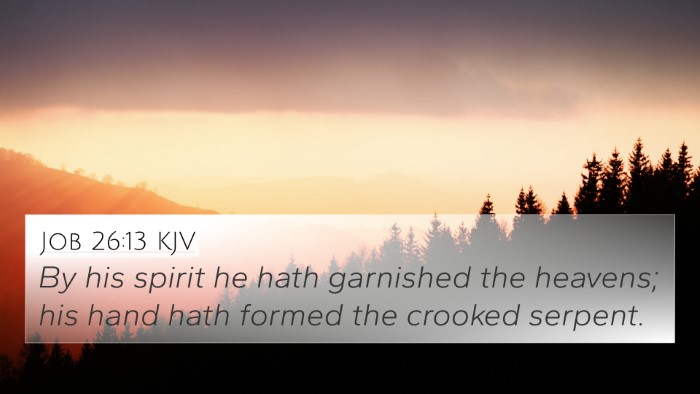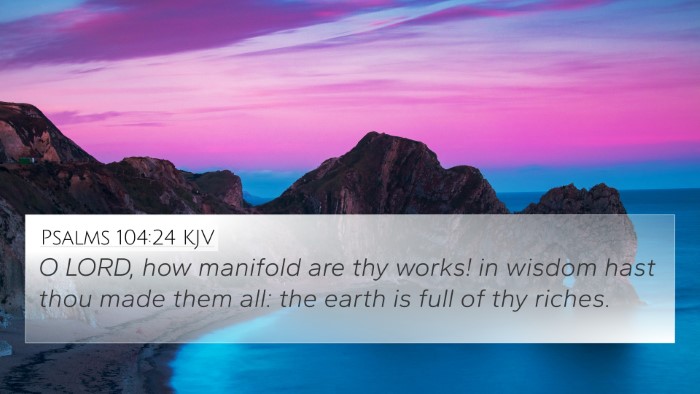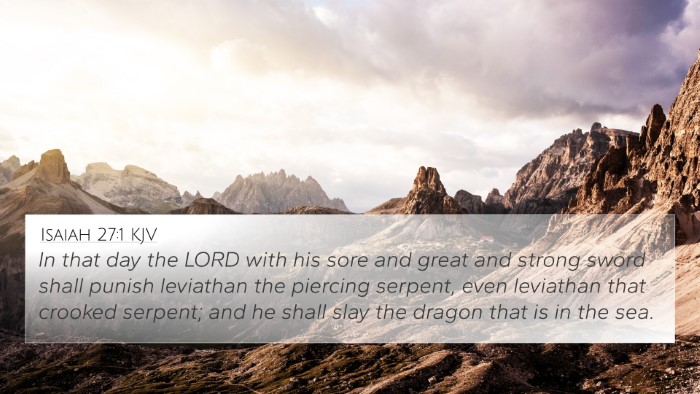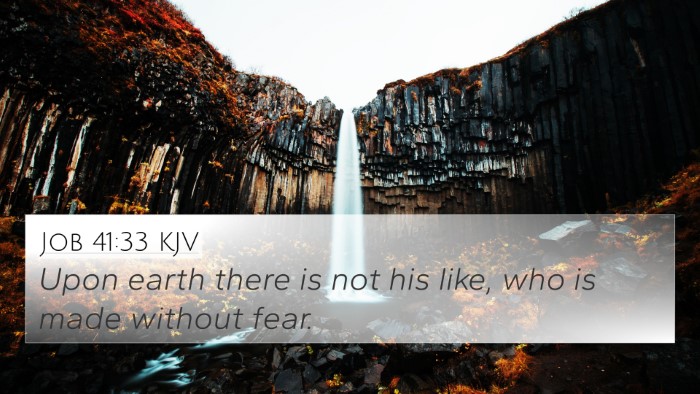Old Testament
Genesis Exodus Leviticus Numbers Deuteronomy Joshua Judges Ruth 1 Samuel 2 Samuel 1 Kings 2 Kings 1 Chronicles 2 Chronicles Ezra Nehemiah Esther Job Psalms Proverbs Ecclesiastes Song of Solomon Isaiah Jeremiah Lamentations Ezekiel Daniel Hosea Joel Amos Obadiah Jonah Micah Nahum Habakkuk Zephaniah Haggai Zechariah MalachiJob 40:19 Similar Verses
Job 40:19 Cross References
He is the chief of the ways of God: he that made him can make his sword to approach unto him.
Uncover the Rich Themes and Topics of This Bible Verse
Listed below are the Bible themes associated with Job 40:19. We invite you to explore each theme to gain deeper insights into the Scriptures.
Job 40:19 Cross Reference Verses
This section features a detailed cross-reference designed to enrich your understanding of the Scriptures. Below, you will find carefully selected verses that echo the themes and teachings related to Job 40:19 KJV. Click on any image to explore detailed analyses of related Bible verses and uncover deeper theological insights.

Job 26:13 (KJV) »
By his spirit he hath garnished the heavens; his hand hath formed the crooked serpent.

Psalms 104:24 (KJV) »
O LORD, how manifold are thy works! in wisdom hast thou made them all: the earth is full of thy riches.

Psalms 7:12 (KJV) »
If he turn not, he will whet his sword; he hath bent his bow, and made it ready.

Isaiah 27:1 (KJV) »
In that day the LORD with his sore and great and strong sword shall punish leviathan the piercing serpent, even leviathan that crooked serpent; and he shall slay the dragon that is in the sea.
Job 40:19 Verse Analysis and Similar Verses
Understanding Job 40:19
Verse: Job 40:19 - "He is the chief of the ways of God: let him that made him make his sword to approach unto him."
This verse is part of the dialogue between God and Job, where God emphasizes His sovereignty and the greatness of His creations. This specific verse draws attention to a creature known for its might and strength, which is interpreted in various ways by commentators.
Meaning and Interpretation
In Job 40:19, God highlights the majesty and strength of a creature, traditionally understood to be the Behemoth, which symbolizes God's creation and power. Below are insights from various public domain commentaries:
-
Matthew Henry:
Henry interprets this verse as a declaration of God's creative authority. The 'chief of the ways of God' suggests that this creature is unparalleled among God's creations. Henry emphasizes God's question to Job, showing that no one, not even Job, has the power to confront such a creature or fully understand its place in the divine order.
-
Albert Barnes:
Barnes elaborates on the identity of Behemoth and its significance as a representation of strength. He notes that God is asking Job to consider the power of His creations and reflects on human limitations in comparison to divine craftsmanship. It is an invitation for Job to submit to God’s wisdom and power.
-
Adam Clarke:
Clarke provides an extensive analysis, exploring various interpretations of Behemoth, suggesting it could be a hippopotamus or a large dinosaur-like creature. He emphasizes the creature's role in displaying God's creative works, encouraging a deeper humility in recognizing human frailty against God's might.
Thematic Connections with Other Scriptures
Job 40:19 connects with several other Bible verses that reflect similar themes of divine sovereignty, the glory of creation, and God's authority over all living things. Here are some notable cross-references:
- Genesis 1:25: "And God made the beast of the earth after his kind, and cattle after their kind, and every thing that creepeth upon the earth after his kind: and God saw that it was good." This verse presents God's creative power over all living beings.
- Psalms 104:24-25: "O LORD, how manifold are thy works! In wisdom hast thou made them all: the earth is full of thy riches. So is this great and wide sea, wherein are things creeping innumerable, both small and great beasts." This passage expresses God's wisdom in creation, echoing Job 40:19.
- Isaiah 40:26: "Lift up your eyes on high, and behold who hath created these things, that bringeth out their host by number: he calleth them all by names by the greatness of his might, for that he is strong in power; not one faileth." Here, God's might in creation is glorified, paralleling the majesty of the creature mentioned in Job.
- Job 39:19-22: "Hast thou given the horse strength? hast thou clothed his neck with thunder? Canst thou make him afraid as a grasshopper? the glory of his nostrils is terrible. He paweth in the valley, and rejoiceth in his strength: he goeth on to meet the armed men." This intimate exploration of God's creation further emphasizes the power and strength endowed to His creatures.
- Romans 1:20: "For the invisible things of him from the creation of the world are clearly seen, being understood by the things that are made, even his eternal power and Godhead; so that they are without excuse." Paul echoes the theme of creation revealing God's power, resonating with Job’s insights into God’s majestic works.
- Psalms 19:1: "The heavens declare the glory of God; and the firmament sheweth his handywork." This affirmation of God’s creations aligns with Job 40’s portrayal of the majesty of the created order.
- Job 37:14: "Hearken unto this, O Job: stand still, and consider the wondrous works of God." An invitation to reflect on God’s creations that parallels the awe demanded in Job 40:19.
- Revelation 4:11: "Thou art worthy, O Lord, to receive glory and honour and power: for thou hast created all things, and for thy pleasure they are and were created." This verse connects the creation’s majesty to the reverence due to the Creator.
- Psalms 148:7-10: "Praise the LORD from the earth, ye dragons, and all deeps: Fire, and hail; snow, and vapours; stormy wind fulfilling his word." The call to all creation to praise God aligns with the theme of divine authority across Job's discourse.
Conclusion
Job 40:19 serves as a profound reminder of God's omnipotence and the depth of His creations. Understanding this verse in the broader context of scripture allows for a deeper appreciation of theological themes including divine sovereignty, the power of creation, and humanity's place within this order. Through cross-referencing passages within the Bible, one can explore the intricate connections between Biblical texts that collectively illuminate God’s ultimate authority and wisdom.
Study Tools for Cross-Referencing
If one seeks to explore cross-referencing in the Bible, the following tools and methods can be utilized:
- Utilize a Bible concordance for locating keywords and themes across scriptures.
- Engage in cross-reference Bible studies where specific verses are compared for thematic similarities.
- Consider employing a Bible cross-reference guide to streamline the study process.
- Explore comprehensive Bible cross-reference materials available in various translations and formats.
- Utilize online and print resources dedicated to Bible verse parallels and thematic connections.



